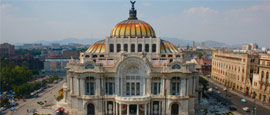Getting around Mexico City
Navigating Mexico City's vast urban sprawl can be a daunting prospect even with a comprehensive and cheap public transport system. However, the metro (tel: +52 55 5709 1133; www.metro.df.gob.mx) makes light work of crisscrossing the metropolis and is at its most efficient when you buy tickets in advance. La Tarjeta del Distrito Federal is the city's reloadable public transport smartcard.
Avoid peak travel times to miss the crowds for an altogether calmer experience. Special women- and children-only carriages run from 1800 and 2100 (Solo Mujeres y Niños). The Xochimilco Light Rail (el tren ligero) is an above-ground system that connects to offer a fast, efficient alternative to bus and taxi travel.
State-run Ruta-100 buses display their destinations on the windscreen and are slow but clean. Mexico's speedy minibuses or peseros (micros) ply the streets of Mexico City for trade and are a fun, if cramped, mode of transport in Mexico City. Schedules are loose with no fixed stops or departures, so allow plenty of time. Simply hop aboard, pay the driver (correct fare) and shout out 'bajan' when you'd like to get off.
All crowded public transport systems in Mexico City are breeding grounds for petty crime, and busy stations, such as Metro Hidalgo, are notorious for pickpockets and bag-snatchers. Choose ATMs with care; carry anything of value with discretion and avoid travelling on public transport after dark.
No taxi is equal in Mexico City, despite regulation, so it is important to establish rates and tariffs. Different taxis offer varying services. The most common are vehicles that serve unfixed routes. Mexico City is renowned for its ubiquitous green and white Volkswagen Beetles that buzz around with a throaty roar. Avoid all unlicensed taxis, however tempting the deal.
In recent years, taxi crime has escalated to sophisticated levels with criminals in unlicensed cabs hanging around official taxi ranks with forged ID. Unlicensed drivers have been linked to violent assaults, robberies and rapes, so if the price is too good to be true, don't get in the cab.
Though more expensive, radio taxis are reliable and safer and are ordered by telephone from hotels and restaurants. Companies include Servitaxis (tel: +52 55 5516 6020) and Radio Taxi Sitio 153 (tel: +52 52 5674 6120).
From the airport and main bus terminals, opt for a fixed-price Transportación Terrestre or autorizado (authorised) taxi. Tickets are prepaid from booths (prices vary according to city zones) and it is not customary to tip the driver.
Driving in Mexico City is not recommended. Traffic can be dense and infuriating, the one-way systems confusing and signposting less than clear. Bumps and collisions are common. Visitors should certainly not drive alone at night, as there have been many reports of hijacking, robbery and assaults on lone drivers. Also, the red lights tend to stop operating at night except on large thoroughfares.
To help ease congestion and pollution, Mexico City operates a 'Hoy No Circula' (Don't Drive Today) policy, where cars are banned from driving for one day each week between 0500 and 2200. The last digit of the registration plate denotes when the vehicle must be taken out of circulation: 5 and 6 on Monday; 7 and 8 Tuesday; 3 and 4 Wednesday; 1 and 2 Thursday; 9 and 0 Friday.
Upscale restaurants and large hotels offer off-street or valet parking. Otherwise cheap estacionamiento público (supervised public car parks) are a good option, though spaces are like gold dust.
Car hire in Mexico is expensive and bureaucratic. Drivers must be a minimum of 23 years old (21 in special cases). A valid driving licence from your home country is required, as is a valid passport and a major credit card. Insurance, tax and fuel are an additional cost to the basic daily or weekly hire rate.
Car hire companies include Avis (tel: +52 55 5762 3262; www.avis.com.mx), Budget (tel: +52 55 5784 3011; www.budget.com.mx) and Hertz (tel: +52 1 800 709 5000; www.hertz.com.mx).
There's a growing network of state-funded cycle paths throughout Mexico City, though it remains far from cycle friendly.
ECOBICI (tel: +52 55 5005 2424; www.ecobici.df.gob.mx) is the city's public bikeshare scheme, with more than 6,000 bikes parked at over 400 stations. One-, three- and seven-day passes are available, after which the first 45 minutes of any journey are free.
Do you have any Feedback about this page?
© 2025 Columbus Travel Media Ltd. All rights reserved. No part of this site may be reproduced without our written permission, click here for information on Columbus Content Solutions.




 You know where
You know where